85 Best Esther Perel Quotes On Marriage, Infidelity & Mating In Captivity
Esther Perel is to relationships what Tom Brady is to the NFL.
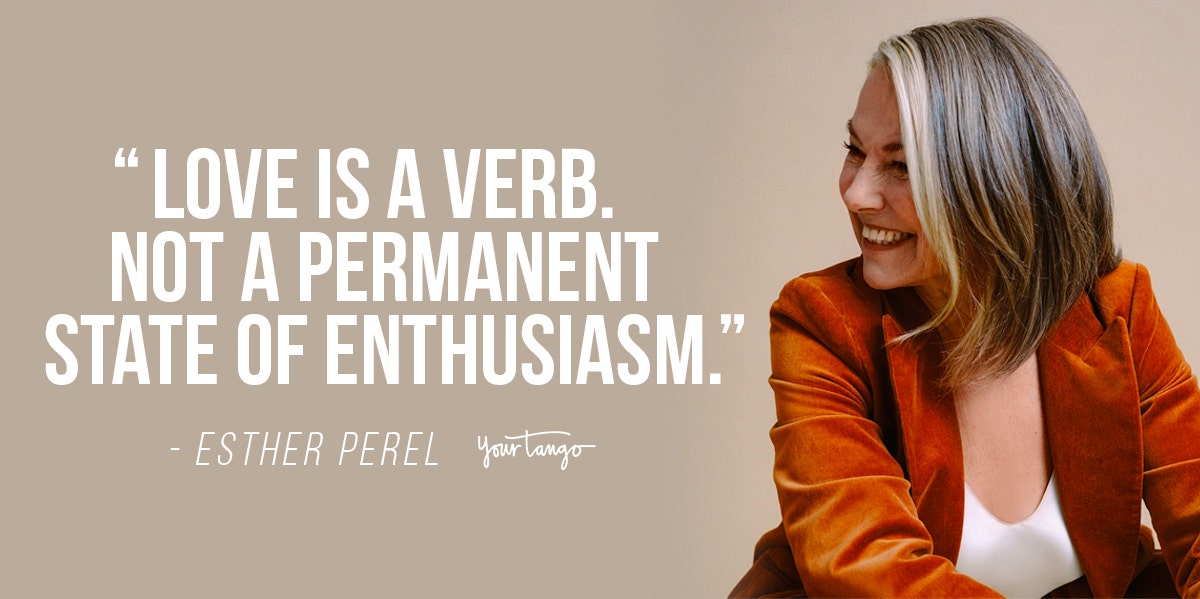 Esther Perel / Facebook
Esther Perel / Facebook Esther Perel is a groundbreaking psychotherapist who has transformed the way we understand love and relationships.
Her best-selling and award-winning book, “Mating in Captivity: Unlocking Erotic Intelligence,” cemented her as the go-to expert on anything involving emotional intelligence, intimacy, and sex.
She has since gone on to publish the New York Times best-seller “The State of Affairs: Rethinking Infidelity” and hosts the podcasts “Where Should We Begin?” and “How’s Work?’
Put simply, Perel is to relationships what Tom Brady is to the NFL.
While booking a coveted session with Perel might not be easy, her books, podcasts, and countless speeches have provided us with priceless words of wisdom.
Here are the best Esther Perel quotes to take to heart when it comes to your own relationships.
1. “Love is a vessel that contains both security and adventure, and commitment offers one of the great luxuries of life: time. Marriage is not the end of romance, it is the beginning.”
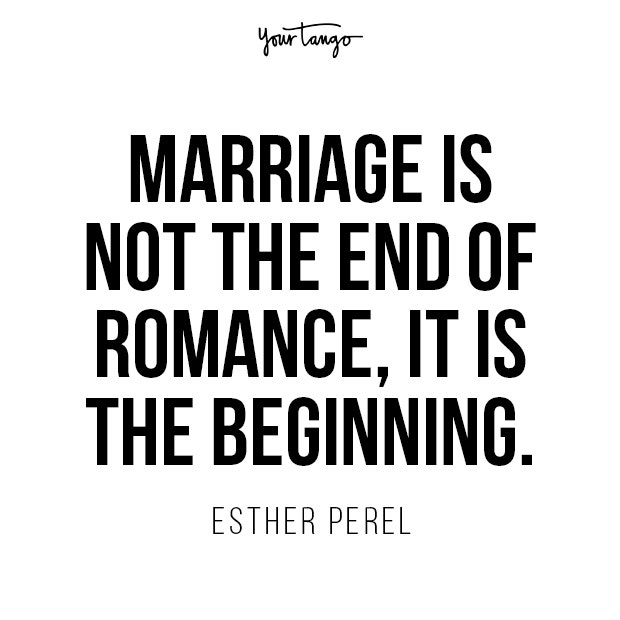
2. “Today, we turn to one person to provide what an entire village once did: a sense of grounding, meaning, and continuity. At the same time, we expect our committed relationships to be romantic as well as emotionally and sexually fulfilling. Is it any wonder that so many relationships crumble under the weight of it all?”
3. “It isn’t so much that we want to leave the person we are with as we want to leave the person we have become.”
4. “Very often we don’t go elsewhere because we are looking for another person. We go elsewhere because we are looking for another self.”
5. “At the heart of an affair, you will often find a longing and a yearning for an emotional connection, for novelty, for freedom, for autonomy, for sexual intensity, a wish to recapture lost parts of ourselves or an attempt to bring back vitality in the face of loss and tragedy.”
6. “When we seek the gaze of another, it isn’t always our partner we are turning away from but the person we have ourselves become.”
7. “Love rests on two pillars: surrender and autonomy. Our need for togetherness exists alongside our need for separateness.”
8. “Love enjoys knowing everything about you; desire needs mystery. Love likes to shrink the distance that exists between me and you, while desire is energized by it.”
9. “Our partner's sexuality does not belong to us. It isn't just for and about us, and we should not assume that it rightfully falls within our jurisdiction.”
10. “If intimacy grows through repetition and familiarity, eroticism is numbed by repetition. It thrives on the mysterious, the novel, and the unexpected. Love is about having; desire is about wanting.”
11. “An expression of longing, desire requires ongoing elusiveness. It is less concerned with where it has already been than passionate about where it can still go. But too often, as couples settle into the comforts of love, they cease to fan the flame of desire. They forget that fire needs air.”
12. “The grand illusion of committed love is that we think our partners are ours. In truth, their separateness is unassailable, and their mystery is forever ungraspable. As soon as we can begin to acknowledge this, sustained desire becomes a real possibility.”
13. “It’s remarkable to me how a sudden threat to the status quo (an affair, an infatuation, a prolonged absence, or even a really good fight) can suddenly ignite desire. There’s nothing like the fear of loss to make those old shoes look new again.”
14. “Being chosen by the one you chose is one of the glories of falling in love. It generates a feeling of intense personal importance. ‘I matter. You confirm my significance.’”
15. “The quality of your life ultimately depends on the quality of your relationships.”
16. “Trouble looms when monogamy is no longer a free expression of loyalty but a form of enforced compliance.”
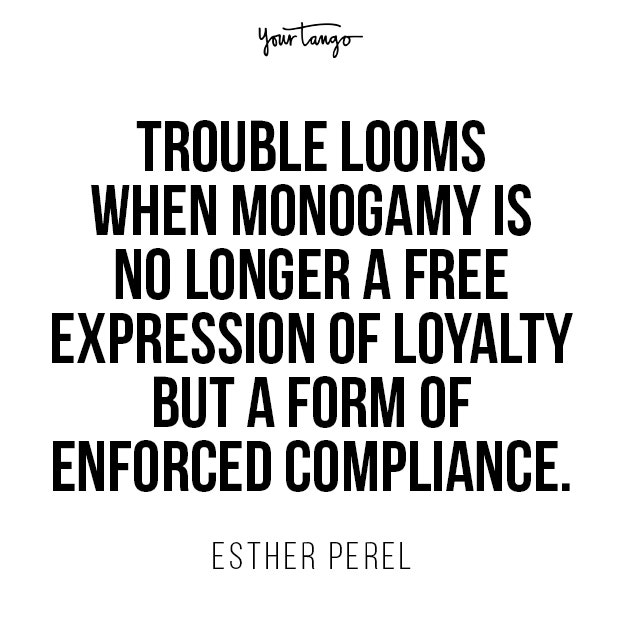
17. “It's hard to experience desire when you're weighted down by concern.”
18. “Love is at once an affirmation and a transcendence of who we are.”
19. “Monogamy, it follows, is the sacred cow of the romantic ideal, for it is the marker of our specialness: I have been chosen and others renounced. When you turn your back on other loves, you confirm my uniqueness; when your hand or mind wanders, my importance is shattered. Conversely, if I no longer feel special, my own hands and mind tingle with curiosity. The disillusioned are prone to roam. Might someone else restore my significance.”
20. “In my work, I see couples who no longer wait for an invitation into their partner's interiority, but instead demand admittance, as if they are entitled to unrestricted access into the private thoughts of their loved ones.”
21. “We seek a steady, reliable anchor in our partner. Yet at the same time we expect love to offer a transcendent experience that will allow us to soar beyond our ordinary lives. The challenge for modern couples lies in reconciling the need for what’s safe and predictable with the wish to pursue what’s exciting, mysterious, and awe-inspiring.”
22. “Despite a 50 percent divorce rate for first marriages and 65 percent the second time around; despite the staggering frequency of affairs; despite the fact that monogamy is a ship sinking faster than anyone can bail it out, we continue to cling to the wreckage with absolute faith in its structural soundness.”
23. “Our partners do not belong to us; they are only on loan, with an option to renew — or not.”
24. “The realization that our loved ones are forever elusive should jolt us out of complacency, in the most positive sense.”
25. “When the impulse to share becomes obligatory, when personal boundaries are no longer respected, when only the shared space of togetherness is acknowledged and private space is denied, fusion replaces intimacy and possession co-opts love.”
26. “Monogamy used to mean one person for life. Now monogamy means one person at a time.”
27. “An affair simply alerts us to a preexisting condition, either a troubled relationship or a troubled person.”
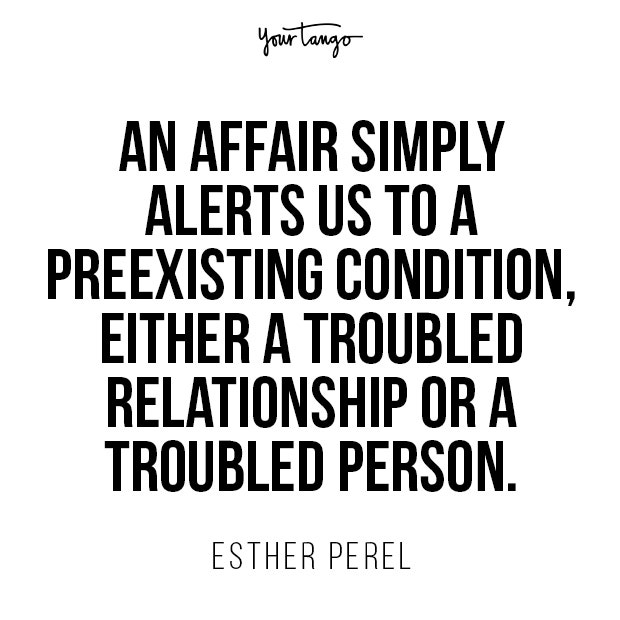
28. “There is more than a hint of arrogance in the assumption that we can make our relationships permanent.”
29. “When you pick a partner, you pick a story. So what kind of story are you going to write? You are the editors of your life stories. Write well and edit often. And remember ... a life story is not a love story. You can love a lot more people than you can make a life with.”
30. “The smaller we feel in the world, the more we need to shine in the eyes of our partner.”
31. “Infidelity has a tenacity that marriage can only envy.”
32. “Once we strayed because marriage was not supposed to deliver love and passion. Today we stray because marriage fails to deliver the love, passion, and undivided attention it promised.”
33. “When marriage was an economic arrangement, infidelity threatened our economic security; today marriage is a romantic arrangement and infidelity threatens our emotional security.”
34. “In our consumer culture, we always want the next best thing: the latest, the newest, the youngest. Failing that, we at least want more: more intensity, more variety, more stimulation. We seek instant gratification and are increasingly intolerant of any frustration. Nowhere are we encouraged to be satisfied with what we have, to think, ‘this is good. This is enough.’”
35. “We set out to make love more secure and dependable, but in the process, inevitably we dial down its intensity. On the path of commitment, we happily trade a little passion for a bit more certainty, some excitement for some stability.”
36. “Until now monogamy has been the default setting, and it sits on the premise (however unrealistic) that if you truly love, you should no longer be attracted to others.”
37. “We narrow down our partner, ignoring or rejecting essential parts when they threaten the established order of our coupledom. We also reduce ourselves, jettisoning large chunks of our personalities in the name of love.”
38. “When we trade passion for stability, are we not merely swapping one fantasy for another?”
39. “All relationships live in the shadow of the third, for it is the other that solders our dyad.”
40. “Is jealousy an expression of love or a sign of insecurity?”

41. “But one theme comes up repeatedly: affairs as a form of self-discovery, a quest for a new (or a lost) identity. For these seekers, infidelity is less likely to be a symptom of a problem, and is more often described as an expansive experience that involves growth, exploration, and transformation.”
42. “When we select a partner, we commit to a story, yet we remain forever curious. What other stories could we have been part of? Affairs offer us a window into those other lives, a peak at the stranger within. Adultery is often the revenge of the deserted possibilities.”
43. “When two become one—connection can no longer happen. There is no one to connect with. Thus separateness is a precondition for connection: this is the essential paradox of intimacy and sex.”
44. “Eventually, if desire withers, monogamy too easily slides downward into celibacy. When this happens, fidelity becomes a weakness rather than a virtue.”
45. “Affairs are always harmful and can never help a marriage or be accommodated. The only way to restore trust and intimacy is through truth-telling, repentance, and absolution. Last but not least, divorce affords more self-respect than forgiveness.”
46. “No woman should give any man the power to shatter her romantic ideals.”
47. “The swiping culture lures us with infinite possibilities, but it also exerts a subtle tyranny. The constant awareness of ready alternatives invites unfavorable comparisons, weakens commitment, and prevents us from enjoying the present moment.”
48. “Affairs have their own brand of passion. Secrecy, torment, guilt, transgression, danger, risk, and jealousy are highly combustible, a Molotov cocktail, an erotic explosion far too threatening in a home with children.”
49. “Spontaneity is a fabulous idea, but in an ongoing relationship whatever is going to ‘just happen’ already has. Now they have to make it happen.”
50. “At their peak, affairs rarely lack imagination. Nor do they lack desire, abundance of attention, romance, and playfulness. Shared dreams, affection, passion and endless curiosityーall these are natural ingredients found in the adulterous plot. They are also ingredients of thriving relationships. It is no accident that many of the most erotic couples lift their marital strategies directly from the infidelity playbook.”
51. “Once divorce carried all the stigma. Now, choosing to stay when you can leave is the new shame.”
52. “When you love someone, how does it feel? And when you desire someone, how is it different? Does good intimacy always lead to good sex?”
53. “A couple’s emotional life together and their physical life together each have their ebbs and flows, their ups and downs, but these don’t always correspond. They intersect, they influence each other, but they’re also distinct.”
54. “Marriage is imperfect. We start with a desire for oneness, and then we discover our differences. Our fears are aroused by the prospect of all the things we’re never going to have.”
55. “Often, when one partner insists that they don’t yet feel acknowledged, even as the one who hurt them insists they feel terrible, it is because the response is still more shame than guilt, and therefore self-focused.”
56. “History and culture have always set the stage for our domestic dramas. In particular, the rise of individualism, the emergence of consumer culture, and the mandate for happiness have transformed matrimony and its adulterous shadow. Affairs are not what they used to be because marriage is not what it used to be.”
57. “Erotic intelligence is about creating distance, then bringing that space to life.”
58. “Some relationships originate in feelings of warmth, tenderness, and nurturance, and the partners choose to remain in these calmer waters. They prefer a love that is built on patience more than on passion. To them, finding serenity in a lasting bond is what counts. There is no one way, and there is no right way.”
59. “Infidelity hurts. But when we grant it a special status in the hierarchy of marital misdemeanors, we risk allowing it to overshadow the egregious behaviors that may have preceded it or even led to it.”
60. “The more we trust, the farther we are able to venture.”
61. “Love is an exercise in selective perception.”
62. “We see what we want to see, what we can tolerate seeing, and our partner does the same. Neutralizing each other’s complexity affords us a kind of manageable otherness.”
63. “Eroticism in the home requires active engagement and willful intent. It is an ongoing resistance to the message that marriage is serious, more work than play; and that passion is for teenagers and the immature.”
64. “If you’re too busy for sex, you’re too busy.”
65. “The caring, protective elements that foster love often block the unselfconsciousness that fuels erotic pleasure.”
66. “When we channel all our intimate needs into one person, we actually stand to make the relationship more vulnerable.”
67. “In fact, dependence is an essential ingredient of connection. But it’s a producer of terrific anxiety, because it implies that the one we love wields power over us. This is the power to love us, but also to abandon us.”
68. “We ground ourselves in familiarity, and perhaps achieve a peaceful domestic arrangement, but in the process we orchestrate boredom.”
69. “In some way one could say sex isn’t something you do, eh? Sex is a place you go. It’s a space you enter inside yourself and with another, or others.”
70. “Instead of looking for a person who checks all the boxes, focus on a person with whom you can imagine yourself writing a story with that entails edits and revisions.”
71. “Love is a verb. Not a permanent state of enthusiasm.”
72. “Allow yourself to feel more deeply the otherness of your partner. You never really possess each other. You just think you do.”
73. “The idea of finding the one is problematic for relationships.”
74. “In the aftermath of an affair, I often tell a couple: Your first marriage is over. Would you like to create a second one together?”

75. “Flirting is about playing with possibility, not going in for the kill.”
76. “Issues and conflict will arise in every relationship. But in healthy relationships, the deeper issue is recognized, and we work to chip away at it, moving from rupture to repair.”
77. “A person who tries to be the perfect partner feels as though they must have it all together, as if that just comes naturally. But in reality, you are allowed to make mistakes, search for yourself, and not have all the answers about who you really are.”
78. “Instead of looking to the other to meet your needs, if you want to reignite your love life, you must take on the responsibility of your own desire.”
79. “Women want to talk first, connect first, then have sex. For men, sex is the connection. Sex is man's language of intimacy.”
80. “It's our imagination that's responsible for love, not the other person.”
81. “If you start to feel that you have given up too many parts of yourself to be with your partner, then one day you will end up looking for another person in order to reconnect with those lost parts.”
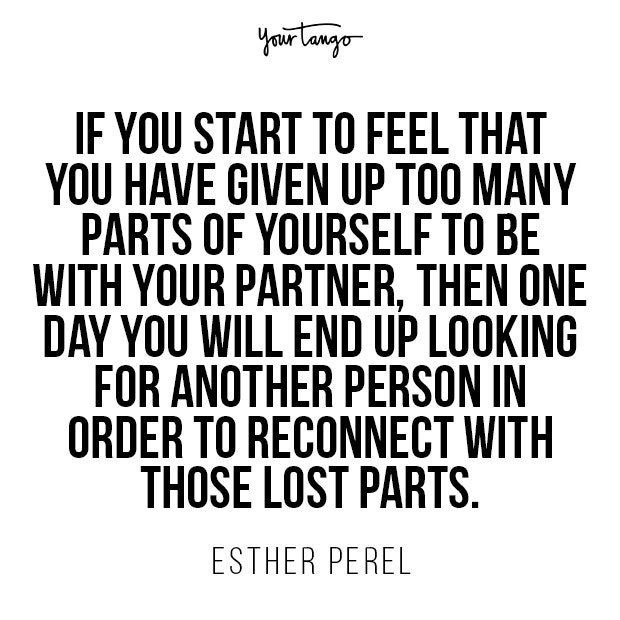
82. “Most of us will get turned on at night by the very same things that we will demonstrate against during the day — the erotic mind is not very politically correct.”
83. “Romantics value intensity over stability. Realists value security over passion. But both are often disappointed, for few people can live happily at either extreme.”
84. “The most common misconception about male vs. female sexuality is that men are creatures of nature, while women are creatures of meaning. Saddled with these narrow ideas of sexuality, our relationships pay the price.”
85. “‘Kitchen-sinking’ is a pattern many couples fall into when they argue. When every past grievance is piled on — the dirty dishes— no one will solve a thing.”
Micki Spollen is an editor, writer, and traveler focused on relationships, news, and pop culture. Follow her on Instagram.

